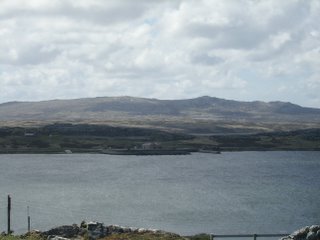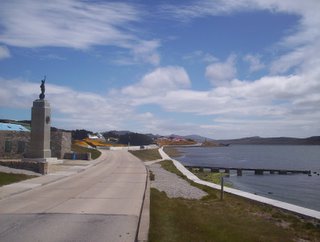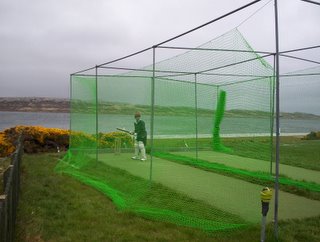
Hello everybody.
I have survived another week in the Falkland Islands, and I must say I am still enjoying myself.
My luggage has finally arrived, and almost in one piece. I think I have now too much to bring back, but we shall see about that later.
This picture is Stanley harbour. In the distance is the 'Narrows' which is the entrance to the harbour. The big ships can not get through, but a lot can.
I am going to be here until the end of January, I want to stay longer, but they can't afford to keep me much longer. I will have to stay until they find a cheaper replacement.
I am staying in the hospital house, a 5 bedroomed house about a 15 min walk from the hospital. A lot of the temporary staff stay their and people come and go all the time.
It is a very tight community and everybody knows everybody, and people look out for each other. It is quite a friendly place, with very little crime, mostly just drink related.
There are quite a few pubs here and the beer is cheap compared to the mainland. I have even been into some of them myself. The highlight of the week I am told is "The Trough" on Saturday night with music from the "Fighting Pig Band". I have been told I have to go at least once before I leave.
I do the same job as I would do in any hospital on the mainland, with a few extra things to do. The workload is a lot less than I am used to, but there is enough to keep me occupied.
I am going to train with the cricket team next week, they have a couple games coming up against the army. Apparently I could even play, but I will probably just umpire.
The weather is quite mild as we are just entering Spring but it is very windy. We are very isolated and low lying. There are very few trees in the islands and there are no major land masses anywhere close by, so we can get some very strong winds here. The weather can change very quickly here.
I am organizing a few day trips to the other islands to see some of the wild life and to go on a battlefield tour to see the major sights. I have re-read my book on the history of Falklands war and to be able to see the actual sights puts it into so much sharper context. Even this week a stash of Argentinean ammunition and guns were found in a house in Stanley.
There is no military presence in Stanley itself, the base and the airport are at Mount Pleasant, about 35 miles away. The locals are free to visit the base & its facilities at any time.
The islanders rely on tourism and the cruise ships have started to arrive. This week we had the QE2. The population of Stanley can double in the afternoon as the passengers off load and walk around the streets. Very occasionaly the weather changes and they are unable to get back to the ship so the locals put them up for the night in their own houses and everybody is looked after.
Hope all is well.
Will post again soon.
























